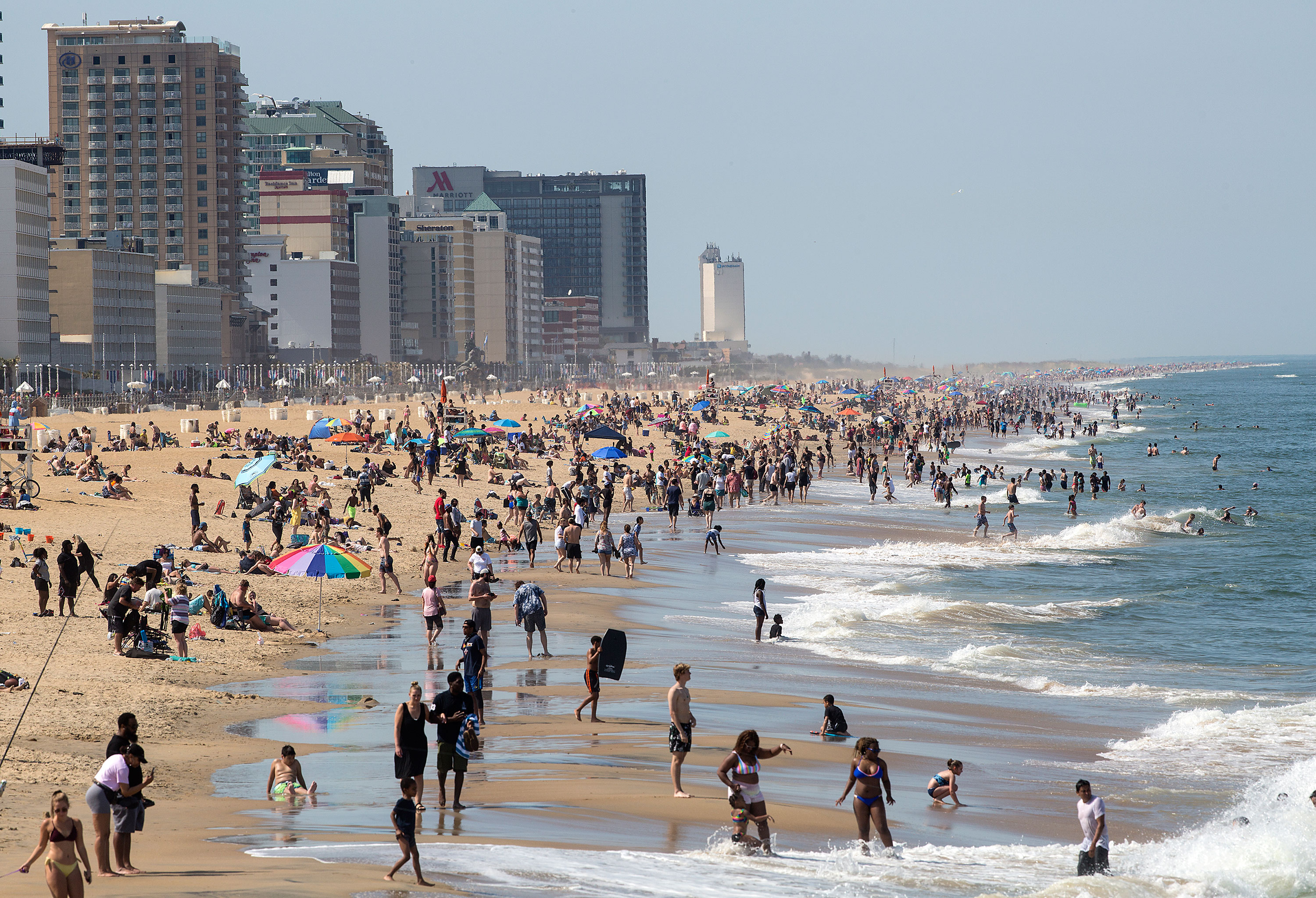Virginia Beach 2024 Shark Attack: Understanding The Risks And Staying Safe
A shark attack incident at Virginia Beach in 2024 has sent ripples through the local community and beyond. This rare but alarming event has prompted questions about beach safety, shark behavior, and how such incidents can be prevented in the future. As news spreads, experts are emphasizing the importance of understanding these powerful creatures and taking proactive measures to ensure safe coastal experiences. While shark attacks remain rare, this incident serves as a reminder of the need for awareness and preparedness when enjoying coastal waters.
The Virginia Beach shark attack of 2024 has captured the attention of both locals and tourists alike. Known for its pristine beaches and vibrant atmosphere, Virginia Beach is a popular destination for water enthusiasts. However, this recent event has raised concerns about the safety of swimming in these waters. Authorities and marine experts are working together to investigate the circumstances surrounding the attack and provide guidance to the public on how to minimize risks.
While shark attacks are statistically uncommon, they often generate significant media attention due to their dramatic nature. This article delves into the specifics of the 2024 Virginia Beach incident, explores the factors contributing to shark attacks, and offers practical advice for beachgoers. By understanding the science behind shark behavior and adopting safety measures, visitors can continue to enjoy the beauty of Virginia Beach with greater confidence.
Read also:Parveen Kaur A Rising Star In The World Of Entertainment
What Happened During the Shark Attack Virginia Beach 2024?
The shark attack at Virginia Beach in 2024 occurred under circumstances that have sparked widespread curiosity and concern. According to initial reports, the incident unfolded on a sunny afternoon when a swimmer was bitten near the shoreline. Emergency responders swiftly arrived at the scene, providing immediate medical attention to the victim. While the severity of the attack is still under investigation, it has prompted a closer look at the environmental factors and human activities that may have contributed to the encounter.
Experts are examining water conditions, shark migration patterns, and the presence of bait fish in the area. These factors can influence shark behavior and increase the likelihood of interactions with humans. Additionally, the timing of the attack—during peak beach season—raises questions about the role of human activity in attracting sharks closer to shore. Understanding these elements is crucial for developing strategies to mitigate future risks.
Who Was Involved in the Shark Attack Virginia Beach 2024?
The victim of the shark attack at Virginia Beach in 2024 was a local resident who frequented the beach for recreational activities. Below is a brief overview of the individual involved:
- Name: [Name Redacted for Privacy]
- Age: 32
- Occupation: Marine Biologist
- Hobbies: Surfing, Snorkeling, and Beach Volleyball
| Personal Details | Information |
|---|---|
| Residence | Virginia Beach |
| Marital Status | Married |
| Education | Bachelor's Degree in Marine Biology |
As a marine biologist, the victim had extensive knowledge of ocean ecosystems and was passionate about promoting marine conservation. This tragic event has underscored the importance of educating the public about coexisting with marine life while enjoying coastal activities.
Why Did the Shark Attack Occur at Virginia Beach 2024?
Understanding why a shark attack occurred at Virginia Beach in 2024 requires a deeper dive into the biological and environmental factors at play. Sharks are highly intelligent predators that rely on sensory cues to locate prey. In this case, experts believe the attack may have been triggered by the presence of bait fish or other attractants in the water. Additionally, the clarity of the water and visibility conditions could have influenced the shark's behavior.
It is essential to note that most shark attacks on humans are cases of mistaken identity. Sharks often confuse swimmers or surfers for their natural prey, such as seals or large fish. By studying the specific circumstances of the Virginia Beach incident, researchers hope to gain insights into how such encounters can be avoided in the future.
Read also:Denzel Washington Twins Exploring The Lives Of The Famous Actors Children
How Can Beachgoers Stay Safe After the Shark Attack Virginia Beach 2024?
In the wake of the shark attack at Virginia Beach in 2024, beachgoers are seeking ways to minimize their risk of encountering sharks. Below are some practical tips for staying safe while enjoying coastal waters:
- Stay close to shore and avoid swimming alone.
- Avoid wearing shiny jewelry or brightly colored clothing, which can attract sharks.
- Refrain from swimming during dawn or dusk, when sharks are more active.
- Pay attention to local warnings and beach flags indicating potential hazards.
By following these guidelines, visitors can reduce their chances of encountering sharks and enjoy a safer beach experience.
What Are the Odds of a Shark Attack at Virginia Beach 2024?
While the 2024 shark attack at Virginia Beach has generated concern, it is important to remember that such incidents are extremely rare. According to statistics from the International Shark Attack File (ISAF), the odds of being attacked by a shark are approximately one in 3.7 million. Despite these low probabilities, the psychological impact of such events can be significant, especially for those who frequent coastal areas.
Local authorities and marine experts are working diligently to monitor shark activity and provide timely updates to the public. By staying informed and adhering to safety recommendations, beachgoers can mitigate their risks and continue to enjoy Virginia Beach with confidence.
Are Shark Attacks Becoming More Common at Virginia Beach 2024?
One question on many minds is whether shark attacks are becoming more frequent at Virginia Beach. While the 2024 incident has drawn attention to the issue, long-term data suggests that shark attacks remain relatively stable. Factors such as climate change, ocean currents, and human population growth near coastal areas may influence the likelihood of interactions between humans and sharks. However, these changes occur gradually over time and do not necessarily indicate a sudden increase in attacks.
Researchers are closely monitoring shark populations and migration patterns to better understand any shifts in behavior. By analyzing trends and sharing findings with the public, scientists aim to promote a balanced perspective on the risks associated with shark encounters.
What Should You Do If You Encounter a Shark at Virginia Beach 2024?
Encountering a shark while swimming or surfing at Virginia Beach can be a frightening experience. However, remaining calm and following expert advice can help ensure your safety. If you find yourself in close proximity to a shark, consider the following steps:
- Slowly and calmly move toward the shore without making sudden movements.
- Avoid splashing or creating excessive noise, as this can attract the shark's attention.
- If the shark approaches, use any available object to create distance between yourself and the animal.
- Report the sighting to lifeguards or local authorities to alert others and gather valuable data.
By taking these precautions, you can minimize the risk of a dangerous encounter and contribute to ongoing efforts to study shark behavior.
Where Can You Learn More About Shark Safety at Virginia Beach 2024?
For those seeking additional information about shark safety at Virginia Beach, several resources are available. The Virginia Marine Resources Commission provides educational materials and updates on marine life activity in the area. Additionally, organizations such as the ISAF and local universities offer workshops and seminars on coexisting with marine wildlife.
By staying informed and participating in community initiatives, beachgoers can play an active role in promoting safe and sustainable coastal experiences. Together, we can ensure that Virginia Beach remains a vibrant destination for all who visit its shores.
Can We Prevent Future Shark Attacks at Virginia Beach 2024?
Preventing shark attacks entirely may not be possible, but proactive measures can significantly reduce the likelihood of such incidents. Education, research, and collaboration among scientists, policymakers, and the public are key to developing effective strategies. Technologies such as shark-detection drones and underwater sonar systems are being explored as potential tools for monitoring shark activity and alerting swimmers to potential dangers.
Ultimately, fostering a deeper understanding of shark behavior and respecting their role in marine ecosystems can lead to safer interactions between humans and these magnificent creatures. By prioritizing conservation and safety, we can create a harmonious relationship with the ocean and its inhabitants.
Conclusion: Embracing Awareness and Responsibility
The 2024 shark attack at Virginia Beach serves as a poignant reminder of the importance of awareness and responsibility when enjoying coastal environments. While such incidents are rare, they underscore the need for vigilance and education. By staying informed, following safety guidelines, and supporting conservation efforts, we can ensure that Virginia Beach continues to be a cherished destination for generations to come.
Table of Contents
- What Happened During the Shark Attack Virginia Beach 2024?
- Who Was Involved in the Shark Attack Virginia Beach 2024?
- Why Did the Shark Attack Occur at Virginia Beach 2024?
- How Can Beachgoers Stay Safe After the Shark Attack Virginia Beach 2024?
- What Are the Odds of a Shark Attack at Virginia Beach 2024?
- Are Shark Attacks Becoming More Common at Virginia Beach 2024?
- What Should You Do If You Encounter a Shark at Virginia Beach 2024?
- Where Can You Learn More About Shark Safety at Virginia Beach 2024?
- Can We Prevent Future Shark Attacks at Virginia Beach 2024?
- Conclusion: Embracing Awareness and Responsibility
Article Recommendations
- Discover The Inspiring Journey Of Dr Alan Mandell A Comprehensive Guide To Dr Alan Mandell Wikipedia

